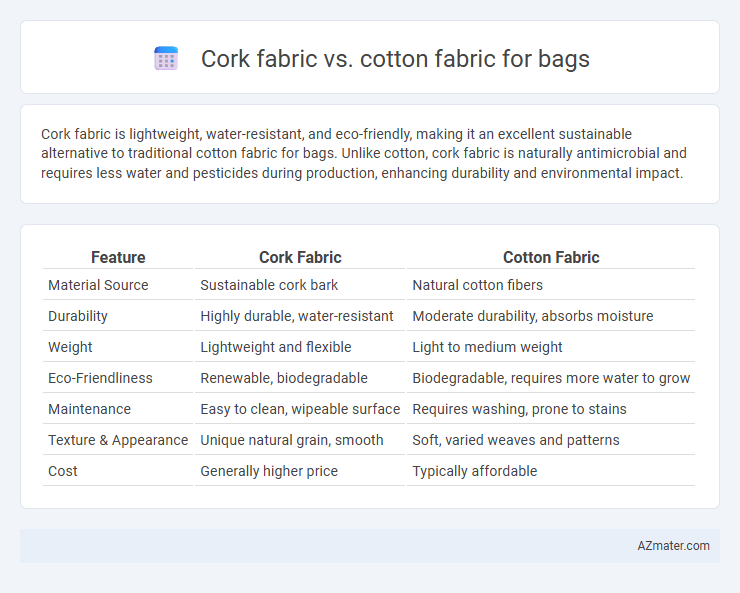Cork fabric is lightweight, water-resistant, and eco-friendly, making it an excellent sustainable alternative to traditional cotton fabric for bags. Unlike cotton, cork fabric is naturally antimicrobial and requires less water and pesticides during production, enhancing durability and environmental impact.
Table of Comparison
| Feature | Cork Fabric | Cotton Fabric |
|---|---|---|
| Material Source | Sustainable cork bark | Natural cotton fibers |
| Durability | Highly durable, water-resistant | Moderate durability, absorbs moisture |
| Weight | Lightweight and flexible | Light to medium weight |
| Eco-Friendliness | Renewable, biodegradable | Biodegradable, requires more water to grow |
| Maintenance | Easy to clean, wipeable surface | Requires washing, prone to stains |
| Texture & Appearance | Unique natural grain, smooth | Soft, varied weaves and patterns |
| Cost | Generally higher price | Typically affordable |
Introduction to Cork Fabric and Cotton Fabric
Cork fabric, derived from the bark of the cork oak tree, is a sustainable, lightweight, and water-resistant material ideal for eco-friendly bags. Cotton fabric, made from natural cotton fibers, offers breathability, softness, and durability, making it a popular choice for versatile and everyday use bags. Both materials provide unique benefits, with cork fabric standing out for its eco-conscious qualities and cotton for its comfort and texture.
Origins and Production Processes
Cork fabric is derived from the bark of cork oak trees mainly harvested in Portugal and Spain through a sustainable, eco-friendly process that involves stripping the bark without harming the tree, allowing it to regenerate over time. Cotton fabric originates from the fibers of cotton plants primarily grown in countries like India, China, and the United States, undergoing extensive cultivation, harvesting, ginning, and spinning processes. Cork production is low-impact and renewable, whereas cotton production typically requires significant water, land, and pesticide usage, influencing the environmental footprint of bag manufacturing.
Environmental Impact and Sustainability
Cork fabric, harvested from the bark of cork oak trees without harming the tree, is highly sustainable due to its renewable nature and biodegradability, making it an eco-friendly alternative to conventional materials. Cotton fabric production demands substantial water and pesticide use, contributing to environmental degradation and higher carbon footprints. Choosing cork fabric for bags significantly reduces resource consumption and supports sustainable forestry practices compared to the more resource-intensive cultivation of cotton.
Durability and Longevity Comparison
Cork fabric offers superior durability and water resistance compared to traditional cotton fabric, making it an excellent choice for bags exposed to moisture and rough use. Cotton fabric, while breathable and flexible, tends to wear out faster and is more susceptible to stains and fading over time. The natural resilience of cork fabric extends the longevity of bags, maintaining structural integrity and appearance longer than cotton counterparts.
Aesthetic Differences and Design Versatility
Cork fabric offers a unique, natural texture with a matte finish that enhances modern and eco-friendly bag designs, contrasting with cotton fabric's soft, smooth surface that supports a wide range of printed patterns and vibrant colors. The visual appeal of cork fabric leans towards minimalist and rustic aesthetics, while cotton fabric provides greater flexibility for intricate designs and various dyeing techniques. Designers often choose cork for sustainable fashion statements and cotton for customizable, colorful, and lightweight bags.
Weight and Comfort for Bag Users
Cork fabric weighs significantly less than cotton fabric, making it an ideal choice for lightweight bags that reduce strain during extended use. Its natural elasticity and smooth texture offer superior comfort compared to the often heavier and stiffer cotton, enhancing the user's carrying experience. Cork fabric also provides water resistance and durability, contributing to long-lasting comfort and practicality for daily bag users.
Maintenance and Cleaning Requirements
Cork fabric for bags offers exceptional resistance to stains and water, requiring minimal maintenance with only occasional wiping using a damp cloth to preserve its natural texture. Cotton fabric bags demand regular washing and careful drying to prevent shrinking, fading, or mildew growth, making maintenance more intensive. Cork's durability and natural antimicrobial properties reduce the need for frequent cleaning compared to the absorbent and less resistant cotton material.
Cost Analysis: Cork vs Cotton Bags
Cork bags typically have a higher initial cost compared to cotton bags due to the sustainable harvesting process and durability of cork material. While cotton bags are generally less expensive upfront, they may require more frequent replacement, increasing long-term costs. The investment in cork bags often provides better value over time due to their water resistance, longevity, and eco-friendly benefits.
Popular Uses in Bag Manufacturing
Cork fabric is popular for eco-friendly and vegan bags due to its water resistance, durability, and lightweight nature, making it ideal for casual totes and wallets. Cotton fabric is widely used for tote bags, backpacks, and reusable shopping bags because of its breathability, softness, and affordability. Both materials offer sustainable options, with cork providing a unique textured appearance while cotton ensures easy customization and vibrant printing.
Choosing the Right Fabric for Your Bag
Cork fabric offers exceptional durability, water resistance, and eco-friendliness, making it ideal for sustainable, long-lasting bags. Cotton fabric provides breathability, softness, and versatility but may require additional treatments for water resistance and durability. Selecting the right fabric depends on your priorities: choose cork for a stylish, resilient bag or cotton for a lightweight, natural feel.

Infographic: Cork fabric vs Cotton fabric for Bag
 azmater.com
azmater.com